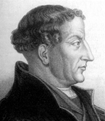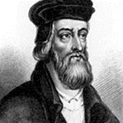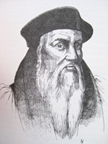Vote for your favorite obscure reformer in the comments section below! List their name and the most succinct and compelling reason why they’re your favorite, and you’ll automatically be entered in a drawing to win a signed copy of Douglas Wilson’s provocative new release Rules for Reformers! We’ve listed a couple below to pique your imagination. Drawing to be held November 26.
1. MARTIN BUCER
Known as the “Peacemaker of the Reformation.” Led Reformation in Strasbourg. Tried to reconcile Lutherans, the Reformed, and Catholics. Died of natural causes on Feb. 28, 1551 in Cambridge, England. His body was exhumed and burnt in 1557.
2. JOHN WYCLIFFE
Translated the Bible into English. Rejected many Roman Catholic practices. Sent out preachers called Lollards. Died of natural causes on Dec. 31, 1384 in Oxford, England. Posthumously declared heretical. His body was exhumed and burnt in 1415.
3. THOMAS CRANMER
Played a large role in the English Reformation. Involved in Henry VIII’s divorce(s). Was burned at the stake on Mar. 21, 1556 in Oxford, England after recanting his recantation. Thus, impossible for him to be exhumed and re-burnt later on.Â
Comment on your favorite! (Or any other obscure/well-known reformers near and dear to your heart…).




Wycliffe.
1. Placed more emphasis on Scripture
2. Inspired Hus and inspired Luther
3. They dug up and burned his corpse. Now THAT’S a reformation legacy
4. Subject of not one, but two, Netflix DVDs (neither of which are ever available for shipping)
Zwingli, despite his Baptist tendencies. Hard to beat the affair of the sausages.
Of the three listed here, I’ll go with Thomas Cranmer because of the v. nice cleft in his beard. An inspiration and an aspiration. Also, because BCP.
Johannes Oecolampadius, who preached against bad jokes in Easter sermons. Also took his name from a house lamp.
I’ll vote for Katharina von Bora Luther, because she put up with Martin and she apparently brewed some really good beer.
Martin Bucer for sure! He kept the other reformers of his day human with plenty of beer and belly laughs. He probably exhibited the fullest expression of what Refornation does in the human heart.
William Tyndale who translated the Bible into English from the original texts at the cost of his life.
Wycliffe for translating the Bible!
Love me some Book of Common Prayer, so of the three I pick Thomas Cranmer.
Bucer! I heard a lecture from Dr. George Grant (years ago) where Grant called him the party animal of the Reformation. Let’s keep the jolly!
Peter Martyr Vermigli (1499-1562)! Considered the father of “double predestination”, he was one of the few Italian Reformers, but ultimately fled Italy and taught at Oxford at the invitation of Cranmer. He greatly influenced the English Reformation. As a Reformed Christian of Italian descent myself who studied at Oxford, I’ve always felt a strong connection with him.
Wycliffe – because sola Scriptura leads to all other sola’s.
Wycliffe. Translating the Bible into English is a pretty big deal.
Martin Bucer! Because who would not love a brother who loves the Word of God and is a Peacemaker!
Henri Arnaud, because every Reformation needs a man who carries a sword and a Bible. I’m also related to him.
Bucer because he rhymes with Luther.
THOMAS CRANMER
I like that he was a member of the group named “Little Germany.”
Wycliffe. He blazed because he was a trail blazer.
My vote is for Wycliffe. It’s hard to calculate the debt we owe him for standing up for Scripture.
Cranmer for sure. The story of him holding his right hand in the flames had a huge impact on me.
I also love how his last words resemble those of Steven.
MARTIN BUCER – Because he was the only one who had a clear catholic view on all the splitter groups of the reformation. (overstatement)
Hugh Latimer, one of the Oxford Martyr’s, for his famous last lines as he was burned at the stake for his Protestant convictions:
‘Play the man, Master Ridley; we shall this day light such a candle, by God’s grace, in England, as I trust shall never be put out.’
Read more at http://en.m.wikipedia.org/wiki/Hugh_Latimer
I’ve always been a big fan of Philip Melanchthon for his coolness, generous adiaphora in a time of heightened shibboleths and disinterest in self-advancement. Also his name means Burnt Earth which is a pretty appropriate name for a Reformer.
Jacques Lefèvre d’Étaples, French humanist and proto-reformer. Although he never left the Roman Church, his clarity on justification brought opposition from Rome and shaped the first generation of the Reformation, namely Luther and Calvin.
Thomas Cranmer! Dude carried his wife around in a box with air holes in it while he was Archbishop… Now that’s commitment.
Thomas Cranmer! The book of Common prayer is such a brilliant work of theology and poetry, and took the reformation to people because worship informs belief. He is the True example of a magisterial reformer, having to navigate the politics of his friend Henry VIII while trying to be faithful to scripture.
William Farel, a fighter and reformer. A street preacher, fearless. The man that persuaded John Calvin to stay in Geneva.
Bucer at the same time defended the split with Rome, and defended the ecumenism of the evangelical church. His influence and calm approach prepared Calvin for longevity in Geneva and guided even England with the second printing of the prayer book. His influence is almost incalculable.